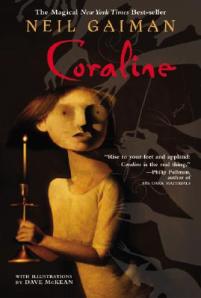 Title: Coraline
Title: Coraline
Author: Neil Gaiman; illustrated by Dave McKean
ISBN: 9780380807345
Pages: 192
Release date: August 2003
Publisher: HarperCollins
Genre: Children’s fiction; fantasy
Format: Paperback
Source: Library
Rating: 4 out of 5
Summary
Coraline is a curious young girl who spends her days exploring her new house and meeting all of its quirky tenants. She discovers a door leading to another world that is nearly identical to her own, except her other mother pays her much more attention and her other father doesn’t insist on preparing fancy meals that Coraline detests.
At first, life seems good on the other side of the door, but Coraline soon finds that not all is as it appears.
Her other parents and other neighbors have black buttons for eyes, and Coraline’s other mother wants to sew a pair on Coraline so that she will never leave her. When the girl refuses, her parents go missing. Coraline immediately suspects her overly affectionate other mother, and she must outfox her, and all of the other residents, in time to save her real parents and herself.
Along the way, Coraline meets three other children, once like herself but now mere ghosts of souls hidden in a closet behind the mirror. Their eerie warnings of the other mother’s wiles echo in Coraline’s ears:
“She’ll take you life and all you are and all you care’st for, and she will leave you nothing but mist and fog. She’ll take your joy. And one day you’ll awake and your heart and soul will be gone. A husk you’ll be, a wisp you’ll be, and a thing no more than a dream on waking, or a memory of something forgotten.”
Indeed, the entire world outside of the house the other mother has constructed is mist and fog, empty and hollow. Coraline must figure out a way to outsmart her cunning other mother and escape this strange world.
Analysis
Coraline envelops you in the mystery and magic of a resourceful and imaginative child’s world.
It is an excellent modern-day fairy tale that incorporates countless elements of folklore and fantasy, from the idea of a disobedient child fighting for the affection of her parents to the existence of other worlds through ordinary-looking doors and mirrors.
But it also has specific elements that are clear nods to classic stories, such as the cannibalistic mother who has “a white hand with crimson fingernails”; cannibalism is a major theme in tales such as Hansel and Gretel, and white and red are very common colors in fairy tales such as Snow White. And you know how much I love fairy tales!
Coraline is accompanied in her quest by a cat vaguely reminiscent of the hookah-smoking caterpillar in Alice in Wonderland. The cat, like many of its breed, is slippery and sarcastic. Coraline finds it nearly impossible to get a straight answer from him:
“Please. What’s your name?” Coraline asked the cat. “Look, I’m Coraline. Okay?”
The cat yawned slowly, carefully, revealing a mouth and tongue of astounding pinkness. “Cats don’t have names,” it said.
“No?” said Coraline.
“No,” said the cat. “Now, you people have names. That’s because you don’t know who you are. We know who we are, so we don’t need names.”
Gaiman’s protagonist is not the scared, stereotypical child you might expect, though. She is smart and tough, with unconventional wisdom and wiles. Her feline companion, too, has many quotable lines, such as in the scene where Coraline upbraids him for playing with a rat before he eats it:
“There are those,” it said with a sigh, in tones as smooth as oiled silk, “who have suggested that the tendency of a cat to play with its prey is a merciful one—after all, it permits the occasional funny little running snack to escape, from time to time. How often does your dinner get to escape?”
This passage entertains but also foreshadows; the cat is obviously talking about Coraline’s other mother here.
Such prose seems written to read aloud, with each word savored. There is an animated film, which I saw when it first came out. However, like most book nerds I’m a big proponent of reading over watching stories; if you do want to see the movie, I recommend at least reading the book first.
After all, it’s a quick, amusing read; I only wanted it to be longer!
Categories: 4-4.5 stars, Book Reviews








Melody, I really enjoyed your review of Coraline as it made me want to read it. I already saw the movie – albeit against my will. It was on the dark side, but it was interesting, so I would love to read the book and enjoy the literary skill of Gaiman. Anyway, thanks for posting!
LikeLike
Thanks, Candace! Yes, the book is definitely worth a read – it’s so short, after all!
LikeLike